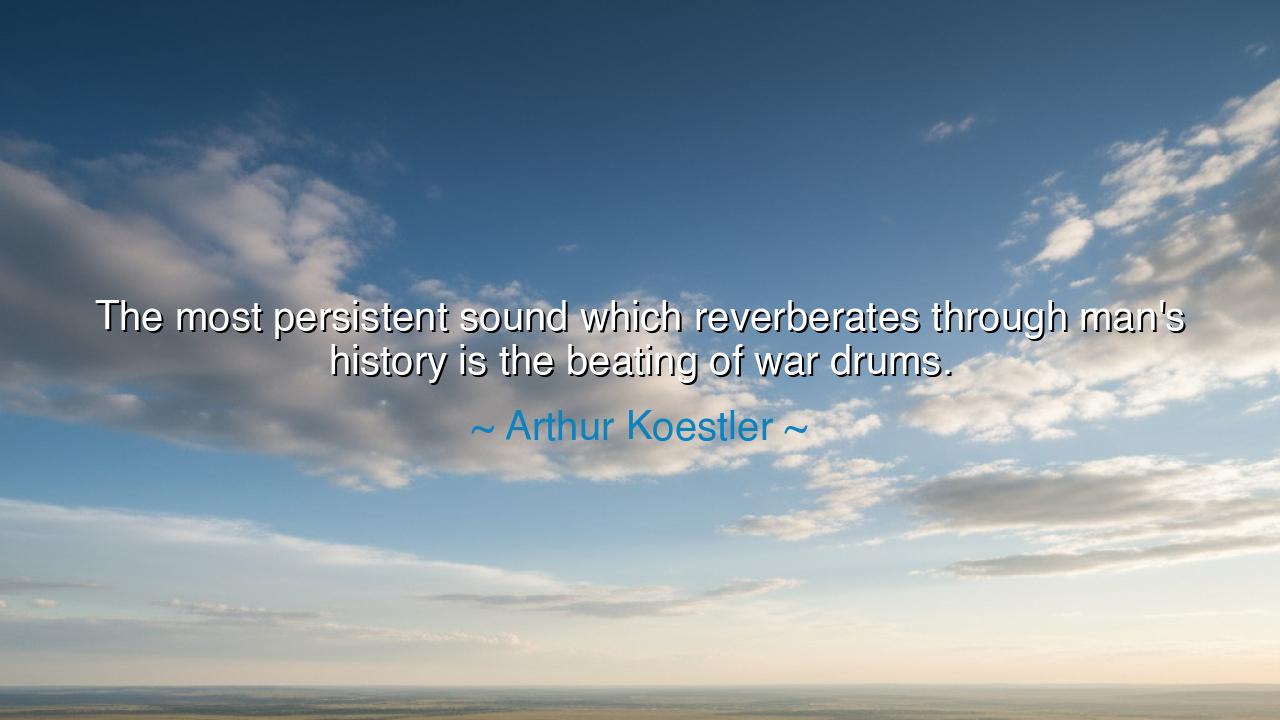
The most persistent sound which reverberates through man's
The most persistent sound which reverberates through man's history is the beating of war drums.






“The most persistent sound which reverberates through man's history is the beating of war drums.” – Arthur Koestler
In these solemn and thunderous words, Arthur Koestler, a thinker forged in the fires of the twentieth century, reveals a truth that echoes across the ages: that the rhythm of human history has too often been measured not by peace, but by war. His phrase, “the beating of war drums,” speaks both literally and symbolically — it is the sound of armies gathering, the pulse of conquest, the heartbeat of empires rising and falling. Yet beneath the literal drumbeat lies something deeper and darker: the restless spirit of conflict that has followed mankind since its dawn. Koestler, who lived through both World Wars and witnessed humanity’s brilliance tangled with its brutality, understood that the sound of war is not merely a noise in time — it is a symptom of our nature.
From the first tribes that clashed with stones and spears to the nations that now wield weapons of fire and steel, the drums of war have never truly fallen silent. They may fade for a season, replaced by the songs of peace, but soon enough they return — insistent, familiar, terrible. Koestler’s lament is not only about the battles fought with armies; it is about the perpetual cycle of human aggression, born from pride, fear, ambition, and greed. He speaks as a historian of the soul, mourning how, century after century, the most enduring human tradition is not the making of art or the pursuit of wisdom, but the repetition of bloodshed.
Consider the fate of ancient Rome, that great and shining empire. Its roads stretched across the world, its laws shaped civilizations, its language built nations. Yet behind every monument stood legions, and behind every victory, a battlefield. The same drums that beat for glory at the gates of Carthage would later echo through its own streets as it fell to ruin. The empire that sought to rule all men was itself consumed by the spirit of conquest it had unleashed. Thus, Koestler’s words ring true: history’s most enduring rhythm is not harmony, but destruction.
Even in our modern age — the so-called “civilized world” — the drums still beat, though they may sound different. No longer do they summon soldiers with horns and banners; they summon nations with rhetoric and propaganda, with the cold precision of politics and technology. The wars of our age are not always fought with swords, but with lies, with hunger, with indifference. We call them “conflicts,” “operations,” “defenses,” but they are all children of the same ancient parent: the human heart divided against itself. Koestler saw this and grieved — for every generation believes itself wiser than the last, yet still marches to the same cruel rhythm.
And yet, we must not mistake his words for despair alone. To hear the “beating of war drums” is also to be awakened — to become aware of the sickness so that we might heal it. If war has been the most persistent sound of our history, then the task of the living is to change the music. Peace cannot be born of silence, but of conscious effort — of minds and hearts that refuse to answer the drum’s call. Each act of understanding, each gesture of compassion, each refusal to dehumanize the other is a note of defiance in the great symphony of mankind.
There are those, throughout history, who have resisted the rhythm of war with the music of peace. Mahatma Gandhi stood against an empire not with armies, but with the force of moral will. His weapon was not a drum, but the silence of truth — a silence so powerful that it shook the foundations of oppression. In his footsteps walked others: Martin Luther King Jr., Nelson Mandela, and countless unnamed souls who dared to believe that humanity could one day outgrow its addiction to violence. Their lives remind us that while the war drums may be persistent, they are not eternal.
So, my child of the future, take this teaching as both warning and challenge: beware the rhythm of war within yourself. It begins not in nations, but in hearts — in the small angers, the quiet prejudices, the hunger to dominate or to prove oneself superior. Each time you choose patience over rage, mercy over vengeance, truth over propaganda, you silence one drum in the vast march of history. Do not wait for kings or generals to end the music; begin the silence within your own soul.
For as Koestler teaches, the sound that has haunted human history need not be its final note. The beating of war drums may be persistent, but the whisper of peace — though softer — is stronger, for it endures where violence destroys. Let that whisper grow into a new rhythm: not of conquest, but of creation; not of fear, but of understanding. And may future generations say that when the drums beat once more, there were those who refused to march — and in their stillness, began the dawn of a gentler world.






AAdministratorAdministrator
Welcome, honored guests. Please leave a comment, we will respond soon